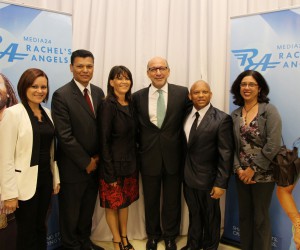Minister in the Presidency and chairperson of the National Planning Commission (NPC), Mr Trevor Manuel was the keynote speaker at the 2012 Rachel’s Angels Annual lecture, where he outlined the NPC’s Vision 2030 “Improving the quality of education in South Africa.”
The state of education in South Africa leaves much to be desired and to some, it seems to be a deteriorating situation. The event was attended by teachers, learners, business and political leaders, as well as various stakeholders who were passionate about developing and improving education.
Minister Trevor Manuel said South Africans should start living out the values found within the constitution. A great deal of thought has gone into the Vision 2030 document and its focus is in line with its title 'Our future - make it work'. Leaders should play an active role in the development of the country.
"In order for South Africans to live out the values found within the constitution, we need to start by eradicating poverty and reducing inequality. No one should live in poverty. There are currently about 20 million or 40% of people in South Africa that live below the poverty line. Many learners go on to higher education having come from communities where education is not attainable," said Manuel.
He continued by warning people of the long term issues of poverty and used the current anger among mine workers and truck drivers as an example.
Education in South Africa does not start at a tertiary level. Therefore we need to strengthen our focus on education, starting at the foundation phase to high school and post school education which should include trade/artisanship. We also need to re-evaluate the quality of training and education found within these and the effects it has on post-university research and innovation.
There is a clear link between what is being taught at tertiary level and what is required in the world of work and that link has faded. There is little to no communication between the two entities and this often results in graduates entering the workplace with qualifications but lacking in skills. In the United States, there are one and a half million BA graduates that are unemployed because they lack the skills needed.
According to Minister Manuel, the NPC looked at other government departments with strong policies and asked the question “Why are we not implementing them?”
He admitted that there is still a huge divide between former model C schools and township schools although they all receive the same state funding.
“The measure of the current problem for me is that we cannot wait until learners get to grade 12 to solve problems, we need to know how to fix the problems long before then. We need to improve maths and science levels even if we have to import educators to educate our teachers and to implement information technology in schools. We are falling behind other African countries including Zimbabwe, in this regard.”
The role of teachers came under the spotlight with continued evaluation of competency. “We need to ensure that teachers feel accountable to principals. Principals need to be appointed on competency and skills – it is a job that requires a skills set to manage 1200 learners.”
Minister Manuel reiterated that every citizen in South Africa has a responsibility in ensuring the positive future of education over the next 18 years. “You cannot pass sole responsibility on to government, everyone has to get involved, who will be the country’s leaders in 18 years time. It is a role that government, educators, civil society and businesses have to be involved in.”
Commenting on the Rachel’s Angels Trust, Minister Manuel said there needs to be more ‘angels’ coming forward to implement programmes to improve the quality of education and mentor learners, some of whom are the first generation to complete matric and go on to further education.
Co-founder and chairperson of the trust, Professor Rachel Jafta said the board of trustees’ aim is to make a difference in education that goes beyond academics. “We take a holistic approach helping students from similar disadvantaged backgrounds who have problems adjusting to the alien environment of university. They have no role models and by the time they get used to university life – three months has already gone by, they are late for their first test series and start to lose confidence as they lag behind their peers.”
“The Rachel’s Angels Trust stands for academic excellence – we encourage particpating schools to compete and do better every year. Last year the pass rate was very good as 95% of our ‘angels’ passed matric.”
Professor Jafta has been nominated in the Shoprite Checkers Woman of the Year awards for her contribution to education.






